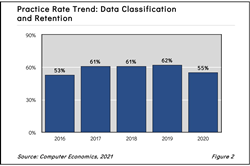
IT Spending and Staffing Benchmarks 2021/2022
In recent years, most IT organizations have been able to use the savings from investments in the cloud and automation to fuel growth. To keep pace with digital transformation and to meet customer expectations, larger budget increases might be needed this year and in the future
LOS ANGELES (PRWEB)
July 29, 2021
It is nothing short of a miracle. No, not just the vaccines. Producing a vaccine in a year against a novel virus was a miracle, but the other miracle was reshaping the entire global economy practically overnight. Many organizations went to fully working at home over a weekend. Everything any consumer needed from healthcare to home improvement could be shipped to their doorstep. The economy went digital, and there is no going back. So even where vaccine rollouts are slow and lockdowns are still in place, IT budgets are going up.
As shown in Figure 1-2 from the free executive summary of our IT Spending and Staffing Benchmarks 2021/2022 study, more companies are planning IT budget increases than at any time in the cloud era. A full three- quarters of companies are planning IT operational budget increases, with only 16% planning budget cuts. And those increases are in line with the increases we saw before the pandemic. At the median, companies are projecting 3.0% IT budget increases.
So more than a year after a global pandemic short-circuited nearly a decade of steady growth, can we say that happy days are here again? Probably, but with some caveats.
At the time of publishing this study, vaccines have been widely introduced in most of the wealthier nations. Cases of COVID-19 are on the decline in those areas. Global supply of the vaccine is improving, so that more countries are beginning to get access. The Organization for Economic Co-Operation and Development is predicting that the global economy will grow 5.8% in 2021, the largest growth since 1973. The US economy rocketed to 6.4% growth in the first quarter of 2021. So, what is the problem?
Unemployment for one, and some companies are making up for previous budget cuts. See more about this in the free executive summary.
But the biggest issue for some companies this year might be inflation. In April 2021, the US consumer price index reached 4.2%, the largest increase over a 12-month period since a 4.9% increase in 2008. Similarly, the producer price index hit 6.6% for the 12 months ending in May 2021, the largest increase since 12-month data were first calculated in 2010. Most experts are predicting this number will hold or increase for the remainder of the year. If these inflation numbers continue, this year will be the first in nearly a decade that IT operational spending increases did not keep pace with inflation. Organizations may actually find that what seemed like an adequate IT budget increase during their planning phase will be woefully short by the end of the year. Pressure on wages, price increases, and shortages of capital equipment are all likely to test leaders as the year progresses.
“Of course, fighting inflation beats fighting the pandemic,” said David Wagner, senior research director at Computer Economics, a service of Avasant Research, based in Los Angeles. “But in recent years, most IT organizations have been able to use the savings from investments in the cloud and automation to fuel growth. To keep pace with digital transformation and to meet customer expectations, larger budget increases might be needed this year and in the future.”
Last year, we admitted in the study that the next few years would be hard to predict. How long the pandemic would last was anyone’s guess. How quickly we would adapt both in the IT department and in the boardroom was up in the air. The role technology played in the quick recovery does give us some clarity.
We predict even stronger growth in the next few years as the economy strengthens. It is unlikely that with increased inflation and a fast recovery that IT budget increases will persist in hovering between 2%–3%, as they did before the pandemic. For years, companies were able to take the gains from the cloud, software as a service (SaaS), and automation and put them back into their IT budgets to limit spending increases. This is likely to end for two reasons. First, over 60% of companies now have at least half of their applications in the cloud. The low-hanging fruit is picked. Second, we are past simply converting on-premises systems to the cloud. We are now in the stage of digital transformation where we are not just replacing existing tools—we are now enhancing them. The future looks bright, but maybe a little expensive.
The Computer Economics IT Spending and Staffing Benchmarks 2021/2022 study is based on a detailed survey of more than 234 IT executives in the US and Canada on their IT spending and staffing plans for 2021/2022. The study provides IT spending and staffing benchmarks for small, midsize, and large organizations and for 28 sectors and sub-sectors. A description of the study’s metrics, design, demographics, and methodology can be found in the free executive summary.
This Research Byte is a brief overview of the findings in our report, IT Spending and Staffing Benchmarks 2021/2022.The full 31-chapter report is available at no charge for subscribers. Individual chapters may be purchased by non-clients directly from our website.
Share article on social media or email:

